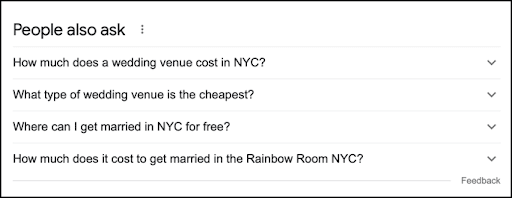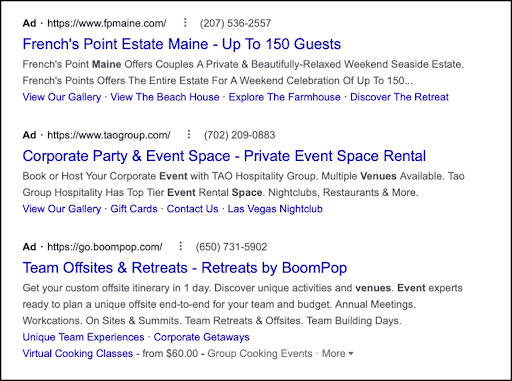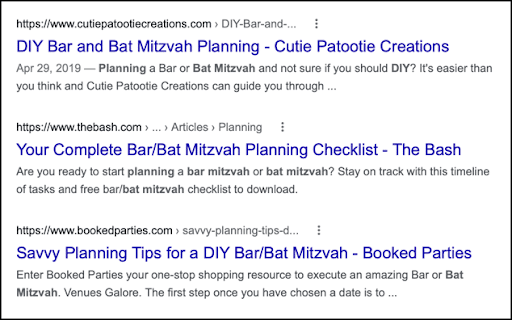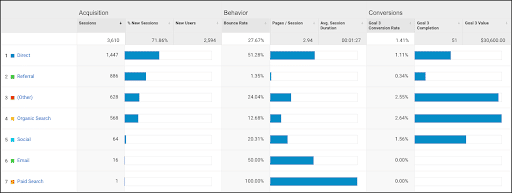Top SEO Tactics for Event Venues

By Rich Brooks, President of flyte new media
Your online presence plays a crucial role in how new event customers find your venue.
At some point in the customer journey, your prospects turn to Google. (Or Bing, albeit less often.) While they may visit social media platforms, review sites, and even third-party booking apps for more advice or information, search is likely the biggest driver of qualified leads to your website.
So how do you outrank your competition and capture more of that search traffic for yourself?
Let’s take a look at the world of SEO (Search Engine Optimization) and the tactics you can use to stand out.
Understanding the Search Engine Results Page (SERP)
These days, searches for event venues will often bring back three main types of results:
- Paid Search: These often appear at the top and bottom of the page when Google believes there is “commercial intent” from the searcher. In other words, if someone is searching for “corporate event space,” it’s likely they are in the market to buy/rent that space, and so Google shows ads.
- Local Search: These appear most often at or near the top of the page. Google shows its “Local Pack,” three listings alongside a map of the area when it believes the search wants a local (near me) or geographically specific location (Boston).
- Organic Search: The original “10 big blue links.” These are almost always served up but often appear below paid and local results if those are included. In the event venue vertical they are often dominated by directories, review sites, and third-party booking sites.
Google may also serve up other types of results based on the exact search. This might include tweets, news stories, videos, or People also ask boxes.

Do your research
In a competitive market like event venues, you might choose to hire an experienced SEO (search engine optimization) agency to help you with some of these tasks, including research, SEO copywriting, link building, and technical SEO. However, if you decide to keep this work in-house, the first step is to do your research.
Keyword research
There are many free and paid research tools to help you uncover which keywords your prospects are searching for at Google. Ubersuggest or Google’s own Keyword Tool are free(ish), while tools from Moz or Ahrefs can cost hundreds of dollars a month but offer deeper results and advanced tools to help you along.
These tools provide information on search volume (how often phrases are being searched) and competition (how many other sites you have to compete with), as well as providing alternative keyword phrases that might perform better. 
SERP research
It’s important to perform the searches you want to rank well for to see the type of results Google provides.
If your search pulls up local results, you need to focus on your Local SEO. If it pulls up list posts (such as “The 20 Best Wedding Cocktails This Season,”) then you need to create list posts. If it pulls up videos, you need to create videos and post them to YouTube. And if you see ads at the top of the page, then you know you need to develop an ad budget if you want to appear for that particular search.
Paid search tips for event venues
Paid search can be a powerful tool to drive traffic from people ready to make a buying decision. It ensures that you appear at the top of page one for your most valuable keywords. However, you pay for every time someone clicks on your ad, so if you’re not careful and strategic, you can quickly blow through your budget.

Here are some tips to better manage your paid search spend:
- Don’t use “broad match” in your campaigns. Many newcomers to Google Ads set their ads to “broad match” to reach the widest audience possible. However, with ads, you want to reach the best audience possible, as you pay for every click. Choose “phrase match” or “exact match” to better control your spend.
- Develop a negative keyword list. Even with this narrower focus, your ads may still get served for inappropriate searches, such as “wedding venue jobs.” Google Ads allows you to create a list of keywords that your ad won’t show for. Regularly monitor your ads and build your negative keyword list to spend more wisely over time.
- Create dedicated landing pages. Never send paid search traffic to your home page! Instead, send that traffic to the most relevant page on your site. Wedding ads go to your wedding page. Corporate retreat ads go to your corporate retreat page. La Quinceanera ads … you get the idea. Even more effective is to create dedicated landing pages for each ad campaign that is not part of your regular site. Include a strong call to action “above the fold” and remove any navigation to the rest of your site; this usually will increase your conversion rates and can actually drive down your cost per click.
Here are some additional tips and detailed examples of paid search strategies.
Improving your Local SEO
Venue searches almost always pull up local results, so Local SEO is critical. Since Google only shows three results (unless someone clicks “Show More,”) you’ll really want to invest some energy here.

While there’s lots you can do to improve your chances, here’s where I’d start:
- Set up and optimize your Google Business Profile (formerly Google My Business). Google relies heavily on the information here, so make sure you fill out your profile as completely as possible, including services, photos, videos, and more.
- Encourage reviews. Google wants to recommend the best results possible, and positive reviews are part of that algorithm. However, don’t try and fake it until you make it! Google has plenty of ways of determining if your reviews are real and will punish you if they see any red flags.
- Optimize your website for your geography. Have a page (or pages) dedicated to your location. If you have multiple locations, each one should have its own page. Put your physical address and local telephone number on every page. Include a Google map on your contact page and potentially in your footer as well.
There’s plenty more you can do to improve your chances, but these three items are a great place to start.
Don’t ignore organic search
Yes, for event venues, the organic results are dominated by directories, review sites, and third-party booking apps. But that’s primarily true for “bottom of the funnel” searches. There are plenty of opportunities to grab some market share from the top of funnel searches…from people who are just starting their research.

To improve your chances of getting found in the organic search results, I’d recommend the following:
- Create blog posts that answer common questions. You can find these questions by joining Facebook groups dedicated to your ideal customers or find “subreddits” on Reddit where people are asking and answering questions. You can also look at the People Also Ask results in Google’s search results.
- Create individual pages for each service or offering. Don’t just have a long list of everything you offer on a single page. Instead, create unique pages with deep content for each of your offerings.
- Include strong calls-to-action on these pages. If someone’s at the beginning of their customer journey, they may not be ready to make a buying decision. However, all is not lost. You can offer them a free download, such as a wedding day checklist or a corporate event budgeting workbook, behind an email registration. Then they can be automatically added to a drip campaign or outreach program so you can stay top of mind.
Measure your SEO results
What gets measured gets improved, right? You should have a copy of (Universal) Google Analytics installed on your website, as well as a copy of GA4 (since Google is sunsetting its current Google Analytics on 7/1/2023) to measure your search traffic volume and conversion rate. To more accurately tell what type of search traffic you’re getting, be sure to set up UTM tracking codes.

If you’re really interested in improving your search rankings and traffic, you can also monitor the search rankings of your site as well as your competitors using tools from companies like Moz, SEMRush, or Ahrefs.
Next steps
For a venue like yours, you’ll likely need to give attention to paid, local, and organic search. If you need an immediate boost, paid search then Local SEO is where I’d put my efforts. For long-term benefits, invest in Local and organic SEO.
If you have any questions or need help with your own search visibility feel free to reach out! Or register for EventCamp on Tuesday, Sept. 13, to attend my session, The BARE Essentials of Digital Marketing.
About Rich Brooks
Rich Brooks is President of flyte new media and founder of The Agents of Change podcast and conference, and is a sought-after speaker on digital marketing and entrepreneurship. He’s the author of The Lead Machine: The Small Business Guide to Digital Marketing and appears regularly on the NBC affiliates in Maine as the “Tech Guru” on the evening news program, 207.